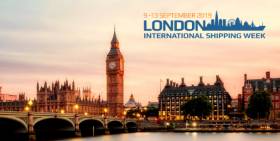Displaying items by tag: London Int Shipping Week
The London International Shipping Week (LISW) which takes place (11-15 September) is a major event in the maritime industry which is held every two years in the UK capital.
LISW 23 is a week-long event that brings together leaders and professionals from the global shipping industry, including ship owners, brokers, traders, regulators, and other stakeholders.
Since its inception a decade ago in September, 2013, LISW has aimed to promote London as a leading hub for international maritime trade and provide a platform for networking, discussions, and the exchange of ideas.
During LISW 23, a wide range of activities will take place, including conferences, seminars, exhibitions, receptions, and social events. These events cover various topics related to shipping, such as market trends, regulations, technology advancements, sustainability, finance, and more.
As the umbrella body for the maritime sector, Maritime UK represents one of the key pillars in delivering the week along with Shipping Innovation, Department for Transport, British Ports Association, Baltic Exchange, Maritime London, The Society of Maritime Industries, UK Chamber of Shipping and UK Major Ports Group.
Maritime UK is responsible for organising several headline components of the week.
The main LISW23 website can be found here
Irish Continue Presence on Banks of the Thames During London International Shipping Week
Following a recent re-enactment to retrace Granuaile, the Irish Pirate Queen's voyage from the west of Ireland to London where she met the Virgin Queen in 1593, the Irish will again be present in the UK capital as part of a major maritime event next week, writes Jehan Ashmore.
The event is the London International Shipping Week (9-13th Sept.) though only first held in 2017, LISW returns to the Thames and is regarded as one of the largest maritime events in the world. During the week, major announcements will be made by industry and government on the future of the UK’s £40bn maritime sector.
Aptly a present day Royal link is connected also with maritime matters as Princess Anne is to launch LISW19 along with senior British Cabinet ministers including Minister for Maritime, Nusrat Ghani MP, when they officially welcome 500 of the world’s leading maritime executives, diplomats and heads of government.
Among the packed-filled event programme of seminars, conferences and receptions is the LISW19 International Maritime Cluster Round Table Debate which is to be sponsored by the Irish Maritime Development Office. The IMDO is an Irish government office which provides support to national and international maritime businesses in Ireland in addition the agency works to provide independent advice and guidance on EU funding initiatives.
The LISW debate will involve maritime clusters represented from those in the UK, Singapore, Monaco, Hong Kong, US, Ireland, Norway, Greece, Cyprus and Malta. Leaders of these maritime clusters from around the world will discuss and debate key issues facing the way clusters operate independently. In addition the debate will provide an opportunity as to how they can improve cooperation between themselves.
Following the debate and discussion session will be lunch held on Wednesday (11th Sept.) at the offices of Norton Rose Fulbright, 3 More London Riverside. The morning invitation only held event has a target audience representing shipowners, managers, brokers, insurance related businesses, ports, regulators and financial services. For further information about LISW19, this can be found on the event's dedicated website here and event guide.
The venue of London Riverside as the name suggests is within sight of Tower Bridge, Pool of London where the re-encactment of Granuaile (Grace O'Malley) voyage (as alluded above) took place at the historic setting of the Pool of London. Afloat will have more from this tourist attraction during the course of the event week.
Completion of the re-enactment trip to the UK capital involved ocean-race boat, Believe in Grace which was solo sailed by Joan Mulloy from County Mayo, whose ancestor was Grace of Malley also known as the Pirate Queen of Mayo.





























































